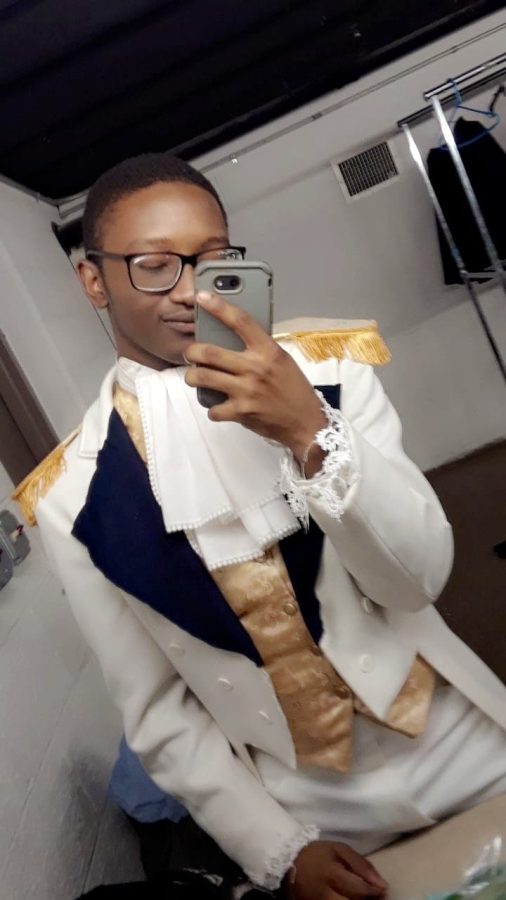OPINION: We won’t stop: People of color breaking barriers in theatre
Wayne Bonner in costume as Prince Hans for the Youngstown Playhouse production of Disney’s Frozen Jr. in December 2019. Courtesy of Wayne Bonner.
Picture this: You’re about to go on stage and perform your face off. You run on to center stage and there they are — a full audience. But some audience members are staring at you with judgmental eyes. “What’s wrong with them?” you ask yourself. “Did I crack? Do I look stupid?”
Then it hits you.
You’re a black person who wouldn’t normally play the role you’re in.
Being black in this industry, I’m very self conscious. I go into audition rooms feeling as if I’m lesser than everybody else in the room. I ask myself, “Why are you here? Why do you waste your time?”
I can count how many times I’ve auditioned for things and have been the only black one in the room. I get the strange looks and occasional whispers. Despite the fear, I only do it to show them we exist, and we can do the same things they can.
Being in a show while black can also be a downer. One time, I was in a show and no one really knew my name so they gave me one.
Tyrone.
Now what would’ve been easier? Calling me Tyrone, a common black man’s name, or asking me what my name was? I would’ve even settled for my character’s name. To be black and be called a stereotypical black name feels almost degrading. It feels as if your identity is being taken from you. It’s like they’re saying, “Let me put you in this box until I get to know you, then I’ll let you out.”
Last December, I was cast as Prince Hans in Disney’s Frozen Jr. at The Youngstown Playhouse. I was ecstatic. A black Prince Hans? Sign me up. There were two other black cast members, but I was the only black male. I felt honored to do it because I got to show young black boys that they can play these kinds of roles too, and that they can break cultural barriers. Stepping into this role, I never looked at the color of Han’s skin. I stepped into who he was and what his motives were for Princess Anna and the kingdom of Arendelle. My castmates saw me as an equal. Our directors, Candace DiLullo and Sarah Demetruk, were all about color blind casting during this production. They didn’t see skin color. They saw and focused on the talent, and I am grateful to them both for seeing my talent and giving me the opportunity to be the first African American to play Prince Hans in Youngstown. Many African American men have played Prince Hans across America, and I’m grateful to have my name added to the list.
One night after the show, I got a few disapproving looks. I even got a direct message on Instagram from an older woman. She said, “Prince Hans is a white character and should have been played by a white character. You’re a very talented young man, but my advice to you is that you should probably audition for parts that fit your race. It’s not a good look.”
I didn’t think I had to be white to tell a story. I didn’t take it to heart, but it still stung a little.
I never took into consideration earlier that me playing Prince Hans would make some people uncomfortable, but it took that to remind myself how amazing I am, and that I have to rise above other people’s ignorance. Racism in theatre is real and it happens. That’s why when we see black actors and actresses or any person of color playing roles that aren’t normal for us, we rave! We rave because we’re causing change and breaking down the wall that separates us.
Now that Frozen Jr. is over, it has challenged me to continue to go and audition for everything and to continue to break barriers and show everyone how equal we all are. I am excited to continue taking roles and showing young black boys that they can do this, too.
We’ve done this for years and won’t stop. So get comfortable.



